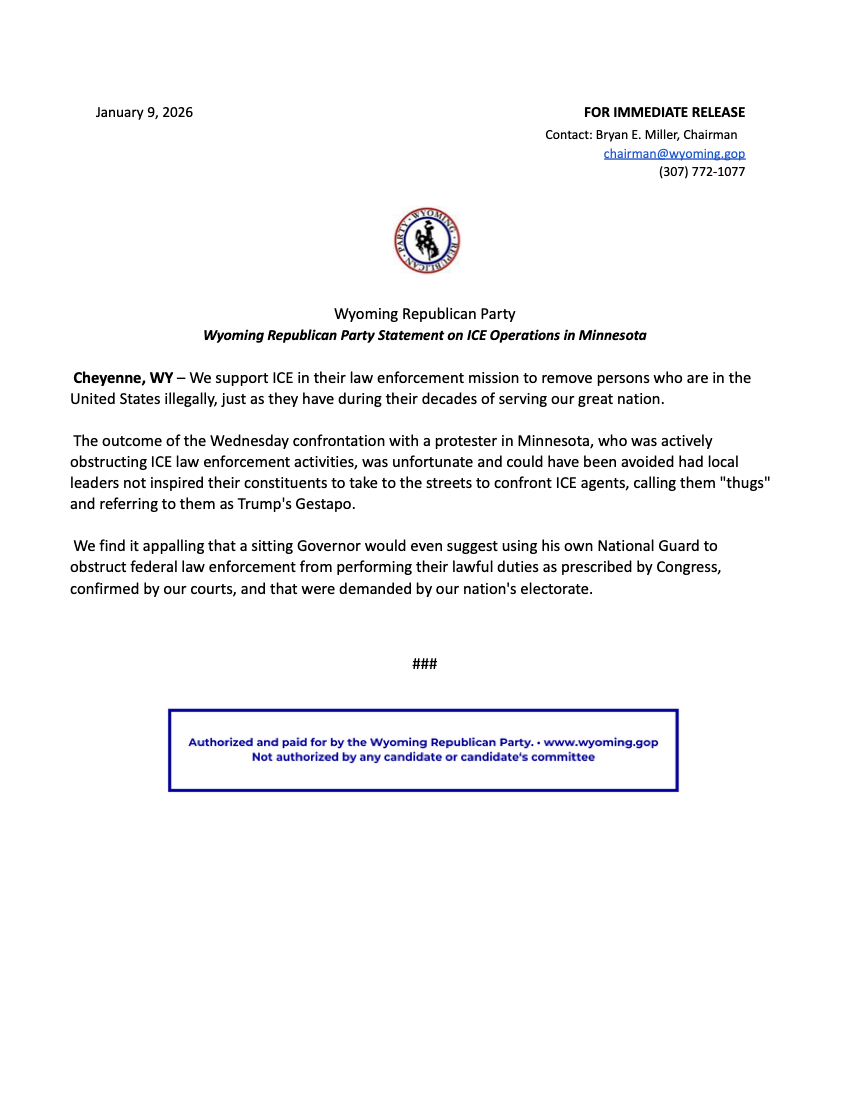LEGISLATIVE UPDATE FEB 14
- Nov 6, 2020
- 3 min read
February 14, 2019
Happy Valentines Day! We love Wyoming and love the values of the Republican party. We know that when Republican values win, Wyoming wins! Thus here are updates on bills directly affecting our party, or relating to Party platform planks that given high priority for this legislative session - abortion law, taxes new or increased, or laws creating and/or expanding special protections for select groups of people.
Bills change quickly – check daily on those you’re following and directly contact your District Legislators and/or the bill’s sponsors with questions or concerns.
Current 6:00 pm Wed 13 Feb 2019
Purpose: Impose a new 7% corporate tax on a select group of businesses.
Latest Action: Thu Feb 7th. Amended bill introduced in Senate; referred to Sen. Corporations Committee (S07). see https://www.wyoleg.gov/2019/Engross/HB0220.pdf
Scheduled hearings: TODAY Feb 14, at 4:00 pm, or on adjournment. Committee hearing. Jonah Building Rm L54
Background:
HB0220 proposes a 7% sales tax on the income of corporate retail, food services and accommodation vendors with 100 or more shareholders (C-Corp’s). This tax rate is slightly below the national average rate of 7.12%.
Arguments made in favor of the bill and some rebuttals being made:
“that’s our money”, and other states are collecting taxes on the income made in Wyoming. A state can’t collect tax on the full income of a multi-state company, so they’ll figure out the proportion of total income from that state. These ‘throwback rules’ are meant to avoid double taxing.
“It’s not a new tax”. Again, the argument appears to be that it’s a tax being collected in other states, so it is not ‘new’. However the 1st sentence of the bill says it’s “creating the National Retail Fairness act; imposing an income tax on businesses…"
“out-of-staters will pay it”. As this bill would affect businesses like WalMart, Albertson’s and Safeway, its difficult to see how the tax would not affect “in-staters” too.
This tax would boost our revenue, and bring in an estimated $45 million, A couple of arguments against the bill are that the estimated cost of administering this new tax, over $15 million, brings the high end of potential income to $30 million. And when the state is facing expenses income by about $700 million or more, the $30 million in potential income seems like a risky gamble.
Other states are doing it. While many states do have corporate income tax as one leg of a 3-legged revenue stool (personal income tax, sales tax and corporate tax) have found that the corporate income tax is the least effective, bringing in only 4.8% of the tax revenue stream compared to 37.1% from personal income tax and 31.7% from sales tax.
Companies won’t be impacted A company with a 2-5% profit margin, common among many, would look at the overall cost of business and manpower challenges in Wyoming and resist coming here, or worse, decide to leave the state, bringing the hoped-for tax revenue down significantly and quickly.
No, this isn’t a pathway to personal income tax. This bill has also been seen as the ‘camel with its nose under the tent’ for wide-spread income tax. The chapter of law this bill would add to, W.S 39-12, currently has only one subsection which gives the state sole authority to tax in Wyoming. In other words, this bill opens a big tax door. The bill, if passed offers a readily amendable statute to expand income taxing to other business classes and to individuals.
This is a conservative approach to bringing money in. This is conservative, in scope by taxing only a small and select out-of-state group of companies, and modest in terms of estimated income, only $45 million - on the high end.
We have to do something to increase our state revenues. Many would agree, and there is considerable enthusiasm of the bill’s 21 legislator cosponsors. It would be reasonable to look at that support and the purpose, increasing revenues through taxes, and the implementation costs, 1/3 of the hoped-for income, and speculate that there is a back burner plan to bring in additional income tax bills. Another approach would be to cut spending.
How can the legislature consider raising taxes in “good faith” when we the people are denied access to how our money is being spent?
Status of related bills: While a number of taxation bills were proposed this session, none appear to have the same intent as this one, to date.





Comments